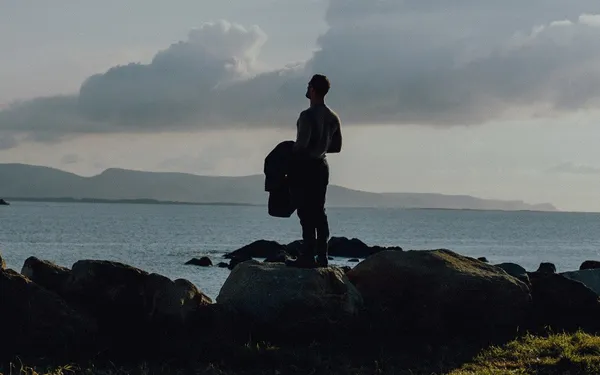 |
| Cosmo Jarvis as Hamish in It Is In Us All. Antonia Campbell-Hughes: 'I didn't realise, but I would say that the tableau, the still scenario is what I find so evocative in what I write' |
Control, freedom and masculinity swirl in Antonia Campbell-Hughes' feature debut. She creates a commanding, brooding mood as Hamish (Cosmo Jarvis), who is visiting Ireland to settle his aunt's estate finds himself increasingly unmoored after a car accident sees him strike up an unsettling relationship with the much younger Evan (Rhys Mannion). We caught up with Campbell-Hughes when the film had its UK premiere at Edinburgh International Film Festival last month ahead of its UK release on September 23.
Amber Wilkinson: I'm interested in the way you're exploring the juncture between the way that one person's out of control is another person's freedom, when it comes to the differences between the older man, Hamish, and the younger Evan.
Antonia Campbell-Hughes: That's a really interesting way to look at it. What I always thought is Hamish's rigidity is like the only way that he can function in the world because he's someone who's never been seen. You can be loved and you can be cherished, and you can be disciplined and all these things but if you're never seen as a human, as an entity, then there is no "real" - that's something that Evan says as well - so therefore, everything else is inconsequential and immaterial. So he has to exist in this sort of prism of control, because nothing else has any value, and has any relation to him. And it's only from this traumatic impact event, the crash, where he's thrust out of what his own control is.
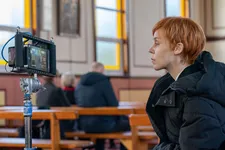 |
| Antonia Campbell-Hughes on the set: 'My work is my entirety. It is my best friend. It's my family. It's my everything' |
And with that lack of control comes the ability to start engaging in seeing and being a part of living. Evan is unbridled, you know, and that's something that I really recognised and saw two different types of male. I thought it could be this story could be placed anywhere, really and these sorts of young people, kids, they have not yet had to develop or learn about consequence and be fearful and consider others - it is completely raw vitality.
AW: Evan's enjoyment of what you might broadly term freedom - his ability to go out in the car and drive fast and live in that way - encounters something else and he begins to sense on some level that maybe he is a bit out of control himself.
ACH: Yeah, absolutely. What effectively it is, is that Hamish is someone who is completely fatalistic. He has no need, or want or desire to hold on to life, it's not precious for him or valuable to him. But as you said, his whole existence is so controlled. Yet Evan is the one who's had such abandon but life is intrinsically precious to him. Each one doesn't really know their own existence in that, until they're confronted with the other.
AW: It's a really interesting tension that the whole film is built around. The film also has an interesting idea about a sort of nostalgia for a thing that you've never actually specifically had. I mean, I know we've talked a lot about this now with people talking about the war that they were never in, for example, in the modern world. But I think that sense of like going back to a place that's very strongly family connected for you, but that you personally have never massively experienced, but you can still feel a lot of nostalgia for that. Hamish, in a way, is also feeling a nostalgia for perhaps a youthful experience that he never had. I feel like both of these things are sort of foreign countries to him, and yet, he has a nostalgia for a thing he didn't have, in a way.
ACH: A lot of people say, is he looking at the life that he could have lived? In a sense, yes, absolutely because so many things are intertwined. But what that does, as well as seeing a life that he could have had is it makes him realise that he's never done it, what he's been deprived of, which is being seen and being validated. You know, because that's what Jack, his father, does. He constantly dismisses him, invalidates him and he emasculates him. And that's something I find very interesting. It hasn't been talked about much, but the grandfather with Evan was very important for me because I wanted to show a man who was also quite rigid, but his tiniest gestures show love and care. And that relationship is something where there's been a long life of love and nurture and care and being seen.
AW: You've said that you feel a bit of that way about Ireland because you know, you lived there till you were two. There's a sort of strange, almost touching distance for a thing that your immediate family members have experienced, I think. And it's exacerbated in Hamish's case, because he can't ask his mother about it.
ACH: No, exactly. Initially, when I first wrote this, the mother storyline wasn't as present. And people said, "Well, why would he stay?" And I said, "Well, why wouldn't he stay?" Because all he's looking for is bought time, he's buying time because he really doesn't care what happens to him? You know, he doesn't swerve. That's the answer, you know. And that's striking enough to him and he did not expect it. He's using the investigation and finding out about his mother to find himself. It's like ET, he observes what humanity is and what makes those moments so precious, because some people can't relate in that way and they look at the rest of the human race, like they're a foreign entity completely and it's hard to engage in that way.
AW: I think you get that sense of him being a stranger in a foreign level, not just physically, being emotionally in a terrain that's very foreign to him. As a female filmmaker, when you're developing these things, and you're trying to get the funding together and everything, I wondered if you came under any pressure, because you're telling a male driven story? I think it's great you did but I feel like in the modern world, there's quite a lot of steering, that people expect female filmmakers to be telling stories with female protagonists.
ACH: I did it very intentionally. It was a women's fund. And I said, "Okay, then I'll make a film about men". And it wasn't for no reason. It was to kind of just flip what we've seen for so many eons, where men tell stories about women, and either one's gonna do the other side, but it's like, but it's not objectification, it is giving platform to an investigation. And gender is relevant, but it's also irrelevant. And through my career as an actress - or actor, I've always said actor - mostly, I've worked with women directors, and I think that's just because the kind of person or actor I am I, they're drawn to me for some reason.
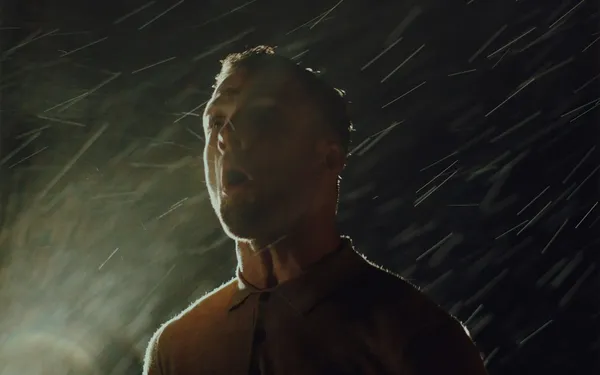 |
| Hamish in It Is In Us All. Antonia Campbell-Hughes on the character: 'What he's dealing with and laboring with is our societal construct of what is male. And that is what his battle is' |
We know that gender is relevant, but I don't think it defines us. I didn't think that I had to necessarily define what this individual and human is going through, because his core isn't individual, but what he's dealing with and laboring with is our societal construct of what is male. And that is what his battle is. And he has to fit into that form and perform a certain way. That's why you know that the sensual aspect, again, I didn't think needed to be defined by age or gender or context. It is just something that is completely pure and it happens between two people who are at a point where everything is very unfocused, it's quite esoteric.
AW: I also wondered about you being within the film, because I know quite often, when you are an actor and step behind the camera, there's often quite a lot of pressure on people to be in the film as well.
ACH: Everything was written quite unconsciously, like, it's not like I'm going to do this for this reason. Cara wasn't there initially. And she was put in, because I was told there had to be a female in it. Like, "We understand your contrary little concept, but a female must go in". And I was like, "No, it's going to be the first male-only film". I did want to challenge and specifically do that. But was told otherwise and rapped on the knuckles. But I thought, if I was going to put a woman in, she had to have a very straightforward function. And she was going to be the voice of reason and Hamish's conscience. And I wanted her specifically to be able to blend with the boys visually, because I've always been interested in mothers and sons, when you walk behind them, they look like two boys. And they have that sort of friendship relationship and it's not necessarily the maternal. I've written things like that before with that sort of dynamic. So I wanted that, so that we understand that, and it's quite true to Northern Ireland, you know, for those young women that have children very young, and they're very agile and light, and they're quite boyish, and I wanted her to have that so we understand her in the context of a group of boys and we can imagine what her relationship would have been like with her son. And also, then, when she's confronted with Hamish, it's unnerving and confusing to him. Because he can't quite place her, you know.
So when I wrote her, I was kind of the obvious casting when it came to it, and I knew I could do it. And I did. You know, there's a lot of I won't will won't well back forth. Mainly of if it's your first film, I don't want to do anything that might hamper the main task at hand. Yeah. It was tricky. Because the shooting conditions were very difficult. Mainly, no money makes everything difficult. It should only be done if it's for the true good of the project. I've been in films where the lead actress has been the director and it's been interesting to watch how they do it, it just has to be very much pre planned and prepared for timewise.
Practically, it just takes more time, because you've got to be in the scene and then come back and watch playback. So if it's nighttime, and you have to end by two in the morning and it's torrential rain, you can't really afford that
AW: To be working with a director who is also an actor must be quite a joy on some level for an actor because you understand their needs, perhaps more than somebody who just directs.
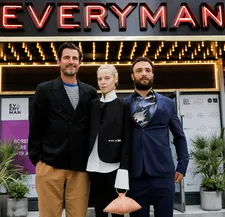 |
| Claes Bang, Antonia Campbell-Hughes and Cosmo Jarvis at the UK premiere of It Is In Us All at EIFF Photo: Lloyd Smith/Courtesy EIFF |
ACH: Maybe. I mean, I learned a lot about myself in that process. I've worked with lots and lots of directors are all different types. And remember, you know, some directors I really love. I would observe other actors feeling maybe that they weren't being given enough by the director, that they weren't being given enough attention and nurture and feedback and things like that. I don't need that as an actor, but some actors really do. And there are different types of directors there are some directors that are really engaged with their actors and performance, some directors are more Bresson school and they look at the tableau and I think I am Bresson school. I didn't realise, but I would say that the tableau, the still scenario is what I find so evocative in what I write. And obviously, the actors and the performances are very fundamental, but I write the tone of the landscape. And I say that also in, you know, within a building, it's not just nature landscape. But the tableau is first for me.
AW: The use of music in the film is interesting. Not just the crucial scene where you've got strobe and hardcore dance music but also the way the kids are doing choreographed dances. It's completely charming and also something that kids do. How did you decide to include that.
ACH: So when I first submitted for funding, I think I gave them 20 pages of script and that was a key scene, because what we wanted again to show was people, they jump onto stereotypes of what certain types of groupings are. People are like, "Oh, yeah, ruffians, kids, driving their cars" and I wanted to show these children that I have observed, who are really naive in a very beautiful way, not, you know, passing judgment. The innocence is so true. They don't even know what embracing their feminine side is because they haven't yet met that judgment of having a label for it. They can dance with each other in a very feminine sense and not think it's too camp or too female or anything like this and that is what you get in these sort of communities. I wanted them to show a real sensuality, without being self conscious of it. I wanted that to be so unnerving for Hamish because he comes from a world where everything means something and everything is judged, and everything is categorised. And they are just completely without conscience.
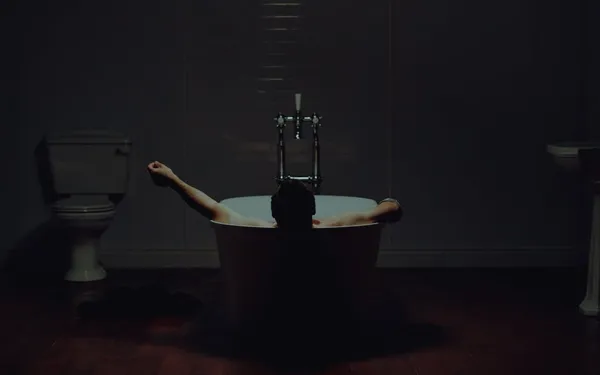 |
| It Is In Us All. Antonia Campbell-Hughes: 'Hamish is someone who is completely fatalistic. He has no need, or want or desire to hold on to life, it's not precious for him or valuable to him' |
What I thought was really interesting is, you know, the fact that tiny children, they know what it is to be seductive without understanding that word. It is the strength and the power they have of their energy fields, and using that. Evan does it but he doesn't understand the consequence, so it's not with a goal or an agenda. He's not trying to score Hamish, but he feels something very connected with him. But Hamish knows what it could mean and he knows the danger of that and that's also what comes with the driving. And Hamish knows he does not have consequences and he could push things too far.
AW: How was casting the younger role because this is his first role.
ACH: I looked at a lot of kids. Obviously, all the obvious types were brought in like little skinny, charming kinds. And none of them were right. And I wasn't looking for something specific, because it's all about in relationship. So when Cosmo came on board, I needed the Evan I have. Rhys is American, he's very poised, he's very groomed, he's very coiffed,he's very polite. So he's not like a raw street boy at all.
But his grace and the way he presents himself is so unnerving, I suppose and his confidence that's what works so well in the dynamic with Hamish.
AW: So are you hoping to do more directing? To keep your acting going in tandem?
ACH: To keep the two going. I think they're completely different and I'm forever curious. I don't like the word ambition, because it just seems cynical. My work as my entirety. It is my best friend. It's my family. It's my everything. And I've been that way, forever since I was a child. I didn't watch TV, I wrote things and it's just the way I am. And so I'd love to do both. They are so different. I am contracted to be doing something acting wise for a long time through next year. But that's perfect because I cannot wait to get started on my next film. I know what it is. For the moment, I'm very lucky for what this one has done to continue making the stories that are in me. I grew up in Switzerland so that's where the next one is set. And that's what I've always wanted to do. I wrote it a long time ago. It's a much more ambitious film in terms of landscape. It's very rich, very opulent. It's about the diamond industry. But it's still trying to address the same themes.
It Is In Us All will be on release across the UK from September 23.





















